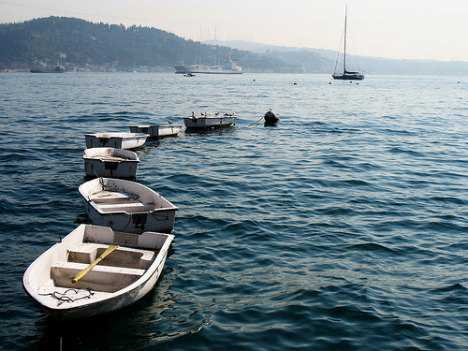From the deck of a boat bobbing on its surface, Istanbul’s Bosphorus Strait seems to flow fresh and strong, breathing air and energy into the city it divides into two continents. When anchored in a secluded cove near the Black Sea end of the strait, it even feels clean enough to swim in. But what lies underneath the waves is apparently another matter altogether.

“Everywhere there are people, there is pollution,” Hakan Tiryaki, the head of the Underwater Cleaning Movement (STH), which works to raise awareness about aquatic pollution, told the Turkish newspaper Hürriyet. Members of the group have dived down to the seabed 250 times since 2005 and say the strait is full of garbage — from old furniture to boat parts, cleaning supplies to restaurant trash. And, of course, plenty of plastic bags. STH divers have removed more than 16,000 pieces of solid waste from just one part of the waterway.
Deliberately Dumped Garbage
Tiryaki believes much of the trash in the Bosphorus is deliberately dumped there. “A truck battery can only be carried by two or three people. Something that heavy cannot fall into the sea accidentally. A 12-square-meter piece of flooring cannot accidentally fall into the sea,” he said. The retrieval of 22 electronic bus passes from one spot on the seabed also raised Tiryaki’s suspicions that an unscrupulous official had treated the strait as a trash can.
Garbage being removed from the Bosphorus. Photo: STH.
The trash problem in Turkey, which we’ve written about before, is not limited to Istanbul. STH divers noted similar conditions in Aegean and Mediterranean coastal areas, findings echoed by readers commenting on the Hürriyet article, who noted seeing “people throwing cigarette butts from ferry boats [and] waiters at coastal restaurants throwing dirty buckets of water straight into the [water]” in Istanbul and a “disgusting” amount of trash — and “depressingly low” levels of marine flora and fauna — in the resort town of Marmaris and its surrounding bays.
Anti-Littering Education, Legislation Needed
Both Turks and tourists contribute to the problem, Hürriyet Daily News columnist John Laughland wrote earlier this month, asking Turkey to please “tidy up a little.” Citing lack of awareness and limited public dumping grounds, Laughland called for televised educational campaigns and effective legislation against both illegal dumping and littering. Creating a culture of shared responsibility is important too, one commenter wrote in response to the column, explaining that people see “public spheres as ‘property of [the] government,’ not their own property they should care about. Have you ever seen Turkish homes having any dust on the floors or tables? I haven’t.”
Another reader agreed, writing: “We need to encourage a sense of belonging, ownership — something very different from nationalism. It can be done but like all these things will take time and energy, particularly teaching schoolchildren, who can in turn help their parents respect their countryside and towns.”
via Istanbul Treats Its Famous and Beautiful Bosphorus Strait Like a Trash Can, Turkish NGO Says : TreeHugger.

